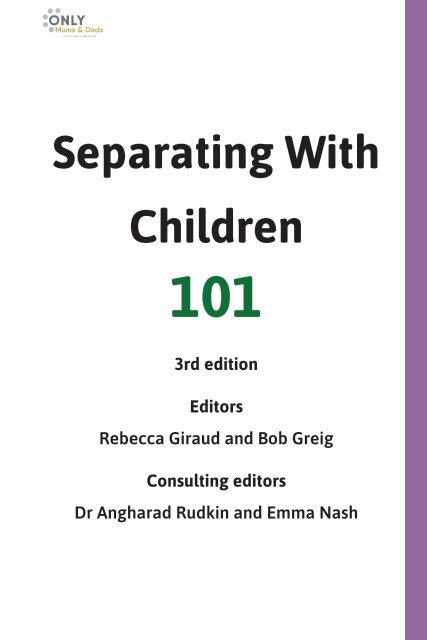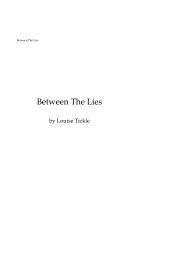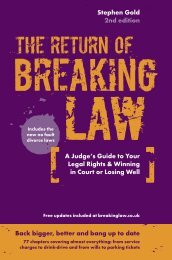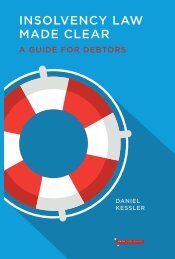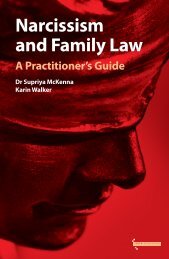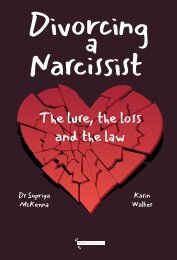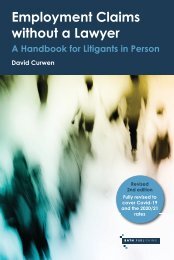Separating with Children 101 Sample Chapters
- No tags were found...
You also want an ePaper? Increase the reach of your titles
YUMPU automatically turns print PDFs into web optimized ePapers that Google loves.
<strong>Separating</strong> With<br />
<strong>Children</strong><br />
<strong>101</strong><br />
3rd edition<br />
Editors<br />
Rebecca Giraud and Bob Greig<br />
Consulting editors<br />
Dr Angharad Rudkin and Emma Nash
First edition published January 2019<br />
Second edition published October 2020<br />
Third edition published April 2023<br />
ISBN 978-1-7393103-0-1<br />
Text © Original authors and contributors<br />
Typography and design © Bath Publishing<br />
All rights reserved. No part of this publication may be reproduced in any material form<br />
(including photocopying or storing it in any medium by electronic means and whether or not<br />
transiently or incidentally to some other use of this publication) <strong>with</strong>out the written permission<br />
of the copyright holder except in accordance <strong>with</strong> the provisions of the Copyright, Designs and<br />
Patents Act 1988 or under the terms of a licence issued by the Copyright Licensing Agency<br />
(www.cla.co.uk). Applications for the copyright owner’s written permission to reproduce any<br />
part of this publication should be addressed to the publisher.<br />
The authors and contributors assert their rights as set out in ss77 and 78 of the Copyright<br />
Designs and Patents Act 1988 to be identified as the authors of this work wherever it is<br />
published commercially and whenever any adaptation of this work is published or produced<br />
including any sound recordings or films made of or based upon this work.<br />
The information presented in this work is accurate and current as at January 2023 to the best<br />
knowledge of the authors. The authors and the publisher, however, make no guarantee as<br />
to, and assume no responsibility for, the correctness or sufficiency of such information or<br />
recommendation. The contents of this book are not intended as legal advice and should not<br />
be treated as such.<br />
Bath Publishing Limited<br />
27 Charmouth Road, Bath<br />
BA1 3LJ<br />
Tel: 01225 577810<br />
email: info@bathpublishing.co.uk<br />
www.bathpublishing.co.uk<br />
Bath Publishing is a company registered in England: 5209173<br />
Registered Office: As above<br />
ii
Introduction from the editors to the 3rd edition<br />
Since setting up our not-for-profit social enterprise OnlyMums & Dads over a decade ago, the<br />
vast bulk of our work has involved pointing separating parents in the right direction when<br />
they encounter problems during their divorce / separation. Parents not agreeing what<br />
happens to the children after a separation is, sadly, not unusual.<br />
Many separating parents have similar questions: What happens to the children and how will<br />
they cope? Do they live <strong>with</strong> one parent or both? How long do they spend <strong>with</strong> their other<br />
parent? How are handovers best arranged? Such<br />
questions form a part in almost all interactions we<br />
have. Concerns about the welfare of the children<br />
when staying <strong>with</strong> the other parent too are frequent.<br />
These questions (and others) have been answered<br />
fully in this book <strong>with</strong> the helpful contributions from<br />
over one hundred leading family justice sector<br />
professionals. There are valuable contributions<br />
from health professionals too. All the content in this<br />
book is aimed to help parents put their children at<br />
the heart of their decision-making.<br />
This 3rd edition sees some important updates. The<br />
welcome arrival of no-fault divorce has resulted in<br />
legal information in this book being updated.<br />
Following the publication of (Almost) Anything But<br />
Family Court by Jo O’Sullivan in 2022 we have taken<br />
the opportunity to strengthen the messaging about<br />
the real upside of parents avoiding the family courts wherever possible. We also welcome<br />
Emma Nash onto the editorial team. Emma runs the Language Matters Project on top of her<br />
day to day work as a family solicitor.<br />
On 23 March 2023 the Government announced proposals that will see mediation become<br />
mandatory in all suitable low-level family court cases excluding those which include allegations<br />
or a history of domestic violence. This will mean separating couples have to attempt to<br />
agree their child and financial arrangements through a qualified mediator <strong>with</strong> court action<br />
being a last resort. This demonstrates the commitment of the Government and others <strong>with</strong>in<br />
the family justice sector to try and keep couples out of the family courts where possible.<br />
Finally, whatever your situation, it is our hope that this book will bring you direction and<br />
greater clarity. We wish you and your family well.<br />
Rebecca, Bob, Angharad, and Emma.<br />
Spring 2023<br />
Dr Angharad Rudkin, Bob Greig, Rebecca<br />
Giraud and Emma Nash<br />
v
Foreword to the third edition by The Rt. Hon. Sir Andrew McFarlane,<br />
President of the Family Division<br />
The publication of <strong>Separating</strong> <strong>with</strong> <strong>Children</strong> <strong>101</strong> is aimed at those who are facing the daunting<br />
and at times bewildering prospect of picking up and reforming their lives after a separation.<br />
The guidance on parenting and finances after separation could not be more welcome,<br />
coming, as it does, at a time when more and more are having to cope <strong>with</strong> these major<br />
life-challenges <strong>with</strong>out professional advice or guidance.<br />
For many, separation from a spouse or long-term partner sufficient to trigger the need to<br />
engage <strong>with</strong> the issues covered in this book will be a once in a lifetime event. They will be<br />
facing the significant challenges that separation generates for the first time and <strong>with</strong>out any<br />
experience or understanding of what may be involved. Expectations of entitlement and of<br />
what is ‘right’ and ‘just’ may run high; emotions may well be both raw and powerful. A<br />
common view amongst the judiciary is that there is a need for a range of interventions aimed<br />
at assisting those who come to the Family Court by managing their expectations at an early<br />
stage as to what the court can and cannot do for them. This book is therefore both welcome<br />
and timely simply because it is most likely to succeed in meeting this very need.<br />
A parent in a family case who is hungry for hard information, sound realistic advice and a<br />
‘feel’ for the court process will find much to feed on in these pages; they may also consume<br />
them knowing that they have been compiled from a gender-neutral perspective, <strong>with</strong> the aim<br />
simply of providing practical and legally accurate information <strong>with</strong>out any underlying<br />
agenda.<br />
Most ‘self-help’ books seem to be penned by a single author or a small team. In contrast, each<br />
question in this book is answered by a different expert. This, obviously, has the benefit of<br />
enhancing the quality of the individual answers, but, in my view, there is a greater value when<br />
the book is read as a whole. Each specialist contribution, like a pixel, builds up to a bigger<br />
picture. Whether the question is about pension sharing or a worry about the alcohol consumption<br />
of the other parent, the author, being experienced in working <strong>with</strong> families and the<br />
Family Court across the board, when describing how best to approach the micro-issue, is also<br />
contributing to an overall understanding of how the legal system engages <strong>with</strong> the issues<br />
generated by separation more generally. It is this latter aspect, which is, in my view, of great<br />
value and marks this work out from others. Irrespective of the current pressing problem that<br />
may have caused a parent to pick this book up, any reader would be well advised to invest the<br />
time in reading it from cover to cover, thereby gaining a real ‘feel’ for the approach of family<br />
law professionals and the courts in general to these important and difficult problems.<br />
The Rt. Hon. Sir Andrew McFarlane<br />
President of the Family Division<br />
13 February 2023<br />
vii
Contents<br />
Contents<br />
THE CONTENTS FIRST DAYS<br />
Introduction from the editors to the 3rd edition<br />
v<br />
Foreword to the third edition by The Rt. Hon. Sir Andrew McFarlane, President of the Family<br />
Division<br />
vii<br />
Acknowledgements<br />
How to use this book<br />
ix<br />
xi<br />
Why this book matters<br />
Fresh hope for separating families 1<br />
Dr David Curl<br />
Language 4<br />
Emma Nash<br />
What does it mean to put children first? 6<br />
Dr Angharad Rudkin<br />
Is it over? 8<br />
Adele Ballantyne<br />
We are separating<br />
<strong>Separating</strong>: are there any practical steps I should take? 12<br />
Emma Cordock<br />
How do I tell the children we are separating? 14<br />
Claire Field<br />
I have children but I am just about to separate. Do I need legal advice? 16<br />
Yanoulla Kakoulli<br />
We’re not married. Does this mean mum gets the children? 19<br />
James Maguire<br />
I have decided to leave the family home. Does this have implications? 21<br />
Jessica Palmer<br />
Common law marriage is a common myth 23<br />
Catherine Bell<br />
What ‘no-fault’ divorce means and how it is different from how things were before 25<br />
Sarah Whitelegge<br />
What is the law relating to the unmarried/cohabiting family? 27<br />
Paul Summerbell<br />
My ex is a narcissist – do you have any tips for dealing <strong>with</strong> this personality type? 30<br />
Dr Supriya McKenna<br />
Karin Walker<br />
Divorce/separation and the use of social media 33<br />
Amanda Adeola<br />
xiii
THE FIRST CONTENTS DAYS<br />
Contents<br />
My partner is having an affair and wants to divorce. What are my options? 35<br />
Helen Pittard<br />
What is the role of friends in separation? 39<br />
Charlotte Friedman<br />
Recognising and dealing <strong>with</strong> stress 41<br />
Dylan Watkins<br />
Samaritans 43<br />
How can technology help parents and children cope after separation? 45<br />
Melanie Bataillard-Samuel<br />
Tom Brownrigg<br />
How can conversations be transformed into a problem-solving approach? 47<br />
Norman Hartnell<br />
Domestic abuse<br />
What are the effects on children who witness domestic violence? 52<br />
Dr Angharad Rudkin<br />
What is Coercive Control? 54<br />
Phillippa Kum<br />
Polly Atkins<br />
What is gaslighting and how do I deal <strong>with</strong> it? 56<br />
Irena Osborne<br />
Domestic violence: a checklist? 58<br />
Beverley Watkins<br />
Help for victims of domestic abuse in the Family Court 60<br />
Lucy Todd<br />
No one believes me - how do I prove I am telling the truth? 63<br />
Jennifer Williamson<br />
What will happen if I contact a solicitor about a domestic abuse concern? 65<br />
Ruth Hawkins & Irena Osborne<br />
Can I get legal aid? 67<br />
Derek Jordan<br />
Can I change the locks on my house to keep my ex from just wandering in? 69<br />
Melanie Westwood<br />
My partner has told me he will take the children away if I report his abuse. What are my<br />
options? 71<br />
Angela Parsons<br />
What about dads coping <strong>with</strong> an abusive female partner? 73<br />
Dr Elizabeth Bates & Dr Julie Taylor<br />
It’s been suggested I get a Prohibitive Steps Order. What is that? 76<br />
Bernadette Hoy<br />
What is a Non-molestation Order? 78<br />
Inayat Nadat<br />
xiv
Contents<br />
The Independent Domestic Violence Advisor (IDVA) 81<br />
Marilyn Selwood<br />
THE CONTENTS FIRST DAYS<br />
<strong>Children</strong><br />
Effects of marital discord on children 84<br />
Dr Angharad Rudkin<br />
Teenagers, young adults and parental separation 86<br />
Angela Lake-Carroll<br />
How can I help my children cope <strong>with</strong> stress and recognise when professional help is needed? <br />
89<br />
Dr Sabina Dosani<br />
Should we ask the children where they want to live, or is that unfair? 91<br />
Emma Taylor<br />
I really don’t think my ex is well enough mentally to look after the kids. What can I do about it?<br />
93<br />
Kate Barton<br />
I’m really concerned that my ex does not look after the children properly. What can I do?<br />
96<br />
Sabrina Bailey<br />
My children have come home reporting inappropriate sexual behaviour. What should I do?<br />
98<br />
Emma Benyon-Tinker<br />
Has my child been kidnapped? <strong>101</strong><br />
Imran Khodabocus<br />
Can you answer some of my concerns about child contact centres? 103<br />
Phil Coleman<br />
My ex has changed the kids’ school and doctor <strong>with</strong>out telling me anything. What should I do? <br />
106<br />
Rachel Duke<br />
Is my ex allowed to change my child’s surname? 108<br />
Marc Etherington<br />
Drugs & alcohol<br />
I am sure my ex is drinking too much when looking after the kids. What should I do? 112<br />
Heather Broadfield<br />
How do I leave my alcoholic partner? 114<br />
Luke Chester-Master<br />
I am sure my ex is taking drugs when looking after the kids. What should I do? 117<br />
Carol-Anne Baker<br />
DNA, hair drug & alcohol tests in families - what do you need to be aware of? 119<br />
Dr Salah Breidi<br />
<br />
<br />
xv
THE FIRST CONTENTS DAYS<br />
Contents<br />
Mediation and non-court options<br />
What are the benefits of a mediated settlement? 124<br />
Jo Edwards<br />
Family Mediation Government Voucher Scheme for separated parents 127<br />
Sushma Kotecha<br />
How can I get the most out of mediation? 129<br />
Sarah Hawkins<br />
Top tips which may help you before your first joint mediation meeting 131<br />
Sheena Adam<br />
Can I refuse to go to mediation? 133<br />
Deborah Butterworth<br />
How do you expect me to mediate? My ex is a total nightmare 135<br />
Paul Kemp<br />
I have an abusive ex. Is mediation right for me? 138<br />
Anna Vollans<br />
How should I prepare for a MIAM? 140<br />
Sarah England & Karen Shirn<br />
How does child mediation work? 141<br />
Angela Lake-Carroll<br />
Are arrangements made in mediation legally binding? 144<br />
Rebekah Gershuny<br />
(Almost) Anything But Family Court 146<br />
Jo O’Sullivan<br />
How to choose professional support 148<br />
Claire Colbert & Rachael Oakes<br />
Money<br />
My soon to be ex-husband has money all over the place. Where do I start? 152<br />
Rachael Oakes<br />
What is child maintenance? 154<br />
Gingerbread<br />
My partner owns the house but I have done all the improvements and upkeep. Where do I<br />
stand? 157<br />
Emma Dewhurst<br />
What should I do if I am going through a divorce and one party has cryptoassets? 160<br />
Victoria Clarke<br />
What if we are separating and have a joint business? 163<br />
Natalie Sutherland<br />
Can you advise me on pension sharing? 165<br />
Mary Shaw<br />
How can people deal <strong>with</strong> debts when they divorce or separate? 167<br />
Hasan Hadi<br />
xvi
Contents<br />
How can I move from a 2-income to a 1-income household? 169<br />
Tom Farrell<br />
Are assets split equally on divorce? 172<br />
Andrew Meehan<br />
THE CONTENTS FIRST DAYS<br />
Going through the family court<br />
The <strong>Children</strong> Act paradox 176<br />
Kathryn McTaggart<br />
How should I prepare for court? 179<br />
James Belderbos<br />
Top tips on the day of court 182<br />
Nicola Sully & Scott Sharp<br />
Should I appoint a barrister? 184<br />
Lucy Reed KC<br />
What does it mean to ‘instruct’ a solicitor? 187<br />
Melanie Bataillard-Samuel<br />
Can I get the Judge to speak directly <strong>with</strong> my children? 189<br />
Jon Armstrong<br />
The children’s guardian and children’s solicitor 190<br />
Sarra Gravestock<br />
What is the Welfare Checklist and do I need to know about it? 192<br />
David Starkey<br />
Advocate 194<br />
Can I change my Cafcass Officer? 196<br />
Mark Leeson<br />
Have you any tips for dealing <strong>with</strong> an abusive partner at a court hearing? 197<br />
Claire Fitzgerald<br />
Sue Scott<br />
What is a C100? 200<br />
Rajan Thandi<br />
Representing yourself in court 202<br />
Olivia Piercy<br />
How should I prepare for a meeting <strong>with</strong> a professional to save time and money? 206<br />
Ursula Rice<br />
What are directions orders? 208<br />
Norman Hartnell<br />
What happens at a fact-finding hearing? 210<br />
Fiona O’Sullivan<br />
What is a Child Arrangements Order? 212<br />
Shanika Varga-Haynes<br />
What is a Parenting Co-ordinator? 214<br />
Claire Webb<br />
xvii
THE FIRST CONTENTS DAYS<br />
Contents<br />
Do courts automatically think kids are better off <strong>with</strong> mum? 217<br />
Gillian Bishop<br />
How will the court decide on where the children will live? 219<br />
Ruth Hawkins<br />
My ex is threatening to take our children abroad. What should I do? 221<br />
Emine Mehmet<br />
What is a Leave to Remove application? 223<br />
Fiona Turner<br />
Lottie Tyler<br />
I’ve been ordered to attend a SPIP by the court. What should I expect? 226<br />
Laura Beech<br />
Broken court orders: what are my options? 228<br />
Dawn Gore<br />
Grant Cameron<br />
Cafcass 230<br />
What records can I keep and can I make secret recordings? 232<br />
Shivi Rajput<br />
Can my ex <strong>with</strong>hold our child’s passport? 234<br />
Caroline Young<br />
What is the law in Scotland? 236<br />
Rachael Noble<br />
Parental alienation<br />
What is parental alienation? 240<br />
Dr Sue Whitcombe<br />
How do I recognise and deal <strong>with</strong> the first stages of alienating behaviour? 242<br />
Alison Bushell<br />
My children don’t want to see their dad. What should I do? 246<br />
Anthony Jones<br />
How does the court deal <strong>with</strong> parental alienation? 247<br />
Jeremy Ford<br />
Co-operative parenting<br />
What makes a successful handover? 252<br />
Ashley Palmer<br />
Do I have to do all the driving? 254<br />
Chris Fairhurst<br />
Co-parenting <strong>with</strong> your ex-partner 256<br />
Marcie Shaoul<br />
What should I do about an unreliable ex? 258<br />
Louisa Dickson<br />
Practical strategies to help children cope <strong>with</strong> two homes 260<br />
Kate Daley<br />
xviii
Contents<br />
Grandparents<br />
The importance of the grandparents’ relationship <strong>with</strong> children 264<br />
Jane Jackson<br />
How can I retain contact <strong>with</strong> my grandchildren after their parents have separated? 266<br />
Alun Jones<br />
I don’t see my grandchildren. What rights do I have? 268<br />
David Kendall<br />
My grandchildren are telling us worrying things and it sounds like neglect. What should we do?<br />
269<br />
Kimberley Bailey<br />
We have ended up as parents to our grandchildren. Can we make it official? 271<br />
Camilla Fusco<br />
THE CONTENTS FIRST DAYS<br />
Profiles<br />
The family solicitor 276<br />
Paul Linsell<br />
The family barrister 278<br />
Stephanie Heidjra<br />
The solicitor neutral 280<br />
David Lister<br />
The chartered legal executive 282<br />
Emma Taylor<br />
The arbitrator 284<br />
Claire Webb<br />
The family mediator 287<br />
Jo O’Sullivan<br />
The child inclusive mediator 289<br />
Louisa Whitney<br />
The divorce specialist financial planner 291<br />
Tamsin Caine<br />
The Pensions on Divorce Expert (PODE) 293<br />
Ian Hawkins<br />
The family consultant 295<br />
Kim Crewe<br />
The counsellor 297<br />
Lesley Edelstein<br />
The divorce consultant 298<br />
Rhiannon Ford<br />
Last words<br />
How to be successful separated parents 302<br />
Angela Lake-Carroll<br />
Final reflections 305<br />
Claire Molyneux<br />
xix
WHY THIS THE BOOK FIRST MATTERS DAYS<br />
Why this book matters<br />
What does it mean to put children<br />
first?<br />
Dr Angharad Rudkin<br />
Clinical Psychologist, MA<br />
(Oxon), CPsychol, AFBPsS<br />
It is so easy to be told that<br />
you need to put your<br />
children first, but what<br />
does that mean exactly?<br />
We need to return to the<br />
notion proposed by Winnicott<br />
in the 1950s that the<br />
best kind of parents is +the<br />
“good enough parent”. This<br />
doesn’t mean being a<br />
perfect parent - it means<br />
being a parent who trundles<br />
along doing an adequate job<br />
for most of the time, who<br />
sometimes messes up and<br />
occasionally outdoes<br />
themselves. This, of course,<br />
is not quite so straightforward<br />
before, during and<br />
after a separation for two<br />
reasons. Firstly, your child is<br />
dealing <strong>with</strong> an enormous<br />
change and therefore needs<br />
a lot more from you at the<br />
very time that, secondly, you<br />
are dealing <strong>with</strong> an<br />
enormous change and just<br />
getting out of bed is difficult<br />
enough. Being a good<br />
enough parent during a<br />
separation can feel like a<br />
superhuman effort.<br />
Caring quota<br />
Imagine everyone has a<br />
‘caring quota’ i.e. an amount<br />
of love, care, organising,<br />
listening to, feeding and<br />
nurturing you can give (to<br />
yourself, your child and<br />
others in your family). Let’s<br />
say the absolute maximum<br />
you can give is 100%. On an<br />
average kind of day your<br />
child may need about 25%<br />
and you may need about<br />
25% for yourself. The rest is<br />
free to give if anyone needs<br />
it. When your child is in the<br />
middle of exams or being<br />
bullied at school, they may<br />
need 75% of your caring<br />
quota, which leaves less for<br />
you and anyone else around<br />
you. When your parent is<br />
very ill or you’ve just been<br />
made redundant, you need a<br />
lot of your own caring quota<br />
to get through each day (say,<br />
80%) leaving just 20% for<br />
your child and everyone<br />
else. During a separation<br />
your child may need 100% of<br />
your caring, at the very same<br />
time you need 100% in order<br />
to function. You don’t have<br />
to be a mathematician to<br />
realise that 200% isn’t<br />
possible.<br />
Getting the balance<br />
right<br />
The key to getting through<br />
this time is balance. Getting<br />
a balance between caring<br />
for you and caring for your<br />
child. Remember, there is no<br />
such thing as a perfect<br />
parent, and there is definitely<br />
nothing like perfection<br />
My child/my children/my family – STOP<br />
If you have a child <strong>with</strong> someone then whatever you<br />
think of them or whatever they might have done they<br />
will still have an important role to play in the life of your<br />
child. Exceptions to this are rare. Possessive language<br />
that excludes or minimises the role of the other parent<br />
can negatively impact the relationship between that<br />
parent and the child and can increase conflict and make<br />
it more difficult to co-parent.<br />
6
during separation. To get<br />
the balance, we need to<br />
think about another area<br />
of research looking at<br />
parenting. Studies have<br />
shown that being a<br />
‘responsive’ parent is one<br />
of the most important<br />
keys to a contented child.<br />
Being responsive means<br />
that you are open to, and<br />
aware of, your child’s<br />
needs. It doesn’t mean<br />
that you always have the<br />
answer or that you know<br />
exactly what to do. But it<br />
does mean listening,<br />
watching and communicating<br />
<strong>with</strong> your child in a<br />
flexible way, so that you are<br />
moving <strong>with</strong> your child’s<br />
changing needs. This may be<br />
where the concept of<br />
putting your child first can<br />
be useful - responding to<br />
your child as they are right<br />
now may mean letting go of<br />
your expectations about<br />
how they should be. If<br />
they’re not upset when you<br />
expect them to be, then<br />
respond to their happiness.<br />
If they’re upset when you<br />
really don’t expect them to<br />
be, then respond to their<br />
sadness rather than your<br />
belief that they should be<br />
absolutely fine.<br />
Some people are better at<br />
being responsive than<br />
others, but what is universal<br />
is that we find it easier to<br />
respond appropriately to<br />
Why this book matters<br />
Putting <strong>Children</strong> First is a phrase you<br />
will hear a lot. It trips off the tongue.<br />
It sounds obvious and straightforward.<br />
We have found that parents who<br />
recognise that they might not always know<br />
what is in their children’s best interest and<br />
are willing to question their own instincts are<br />
probably those who end up really making<br />
the best decisions for their children. Don’t be<br />
afraid to ask for help/advice. <strong>Separating</strong> <strong>with</strong><br />
children is rarely easy or straightforward.<br />
others when we are being<br />
cared for. Talk to friends and<br />
family about your feelings,<br />
spend time <strong>with</strong> people who<br />
make you feel happy. Being<br />
able to relax and download<br />
some of your feelings will<br />
mean that you have more<br />
head and heart space to<br />
respond to your children.<br />
Child’s point of view<br />
The final aspect of putting<br />
your child first is to imagine<br />
how things feel from their<br />
point of view. Remembering<br />
our own childhood can help<br />
us to understand our own<br />
children. If you find it hard to<br />
tap into memories of your<br />
childhood, read books about<br />
children so that you can<br />
understand how they see the<br />
world. And if you are in<br />
doubt, ask them how it feels<br />
to be them right now. They<br />
may not give you an answer,<br />
but the fact that you’re<br />
asking will help them feel<br />
valued.<br />
Conclusion<br />
So, should you put your child<br />
first? There are no ‘shoulds’<br />
at a time like this. Instead,<br />
aim to be responsive to your<br />
child. Try to understand how<br />
they are feeling while<br />
accepting that their feelings<br />
and needs will change<br />
rapidly. Look for a balance<br />
between what you require to<br />
get yourself through, and<br />
what they need. Listen,<br />
watch and communicate<br />
<strong>with</strong> openness. The rest will<br />
then take care of itself.<br />
WHY THE THIS FIRST BOOK DAYS MATTERS<br />
7
DOMESTIC ABUSE<br />
Domestic abuse<br />
What is Coercive Control?<br />
Phillippa Kum<br />
Associate at Hunters<br />
Polly Atkins<br />
Associate Solicitor at<br />
Hunters<br />
Coercive and controlling<br />
behaviour is often a<br />
covert form of abuse. It<br />
can be insidious and difficult<br />
to evidence but causes<br />
serious harm to the victim.<br />
Since 2015, coercive control<br />
has been a criminal offence<br />
in England and Wales.<br />
Am I experiencing<br />
coercive control?<br />
Whilst the term ‘coercive<br />
control’ has become<br />
familiar, they are in fact two<br />
separate behaviours which<br />
constitute an offence of<br />
domestic abuse.<br />
Controlling behaviour is an<br />
act or series of acts intended<br />
to make you feel dependent,<br />
isolated or subordinate.<br />
Examples of such behaviour<br />
include:<br />
• Isolating you from your<br />
family, friends and<br />
support system;<br />
• Controlling your finances;<br />
• Depriving you of your<br />
independence and basic<br />
needs, for example, not<br />
letting you have access to<br />
a vehicle or denying you<br />
access to support;<br />
• Repeatedly putting you<br />
down by being critical of<br />
your worth, or by name<br />
calling; or<br />
• Regulating your everyday<br />
behaviour by monitoring<br />
your activities and<br />
movements by, for<br />
example, hacking into<br />
your accounts.<br />
Coercive behaviour is an act<br />
or series of acts that an<br />
abuser uses to make you<br />
feel punished, scared and<br />
frightened.<br />
For example:<br />
• Threatening to harm or<br />
kill you or your loved<br />
ones, or to publish<br />
information about you, or<br />
reporting you to the<br />
police or authorities;<br />
• Damaging your property;<br />
• Intimidating and/or<br />
humiliating you, for<br />
example, through the<br />
enforcement of<br />
unnecessary and<br />
demeaning rules or<br />
comments in front of<br />
others or privately;<br />
• Assaulting you; or<br />
• Forcing you to participate<br />
in criminal activity or<br />
child abuse.<br />
To fall <strong>with</strong>in the criminal<br />
definition of coercive<br />
control, these behaviours<br />
must come from someone<br />
who is personally connected<br />
<strong>with</strong> you. This includes<br />
someone you have an<br />
intimate personal connection<br />
<strong>with</strong>, such as a spouse<br />
or partner. If you both live<br />
under the same roof, a<br />
personal connection also<br />
includes a family member,<br />
or someone who you have<br />
had a previous intimate<br />
relationship <strong>with</strong>.<br />
If it is safe to do so, you may<br />
find it useful to keep a diary<br />
of key behaviours to<br />
establish a pattern of events<br />
which could help you to tell<br />
others about your<br />
experience and also to<br />
demonstrate patterns of<br />
54
ehaviour which emerge.<br />
What happens when I<br />
report coercive<br />
control?<br />
Your abuser will be guilty of<br />
this criminal offence if:<br />
a. They repeatedly or<br />
continuously engage in the<br />
controlling or coercive<br />
behaviour against you;<br />
b. You both are personally<br />
connected at the time of the<br />
behaviour;<br />
c. This behaviour has a<br />
serious effect on you; and<br />
d. They know or ought to<br />
know that the behaviour will<br />
have a serious effect on you.<br />
In this context, serious effect<br />
means that the behaviour<br />
causes you to:<br />
• Fear, on at least two<br />
occasions, that violence<br />
will be used against you,<br />
or<br />
• Experience serious alarm<br />
or distress which has a<br />
substantial adverse effect<br />
on your usual day-to-day<br />
activities. For example,<br />
your physical and/or<br />
mental health has<br />
deteriorated, your social<br />
life has changed, or you<br />
have changed the way<br />
you behave <strong>with</strong>in the<br />
house by having to<br />
implement safeguarding<br />
measures. These effects<br />
could also be in your<br />
workplace such as your<br />
working patterns and<br />
journey.<br />
If convicted, an abuser could<br />
be jailed for up to five years,<br />
or made to pay a fine, or<br />
both. In addition, they may<br />
also be guilty of other<br />
criminal offences. For<br />
example, if the controlling<br />
or coercive behaviour<br />
involved the breaking of<br />
your electronic devices or<br />
personal possessions, they<br />
would have also committed<br />
the offence of criminal<br />
damage.<br />
Protection in the<br />
Family Court<br />
The Family Court has a<br />
range of powers to deal <strong>with</strong><br />
coercive control. It can make<br />
a non-molestation order<br />
which protects you and any<br />
relevant child from harassment<br />
or violence. It can<br />
prohibit certain behaviours<br />
from your abuser, such as<br />
contacting you or being<br />
violent towards you. The<br />
breach of a non-molestation<br />
order is a criminal offence,<br />
so you are able to report the<br />
breach of the order directly<br />
to the police. The Family<br />
Court can also make an<br />
occupation order dealing<br />
<strong>with</strong> who lives at the family<br />
home. If appropriate, this<br />
could order your abuser to<br />
move out of the property or<br />
to keep a certain distance<br />
away from it. Some occupation<br />
orders have a power of<br />
arrest attached to it, which<br />
allows police officers to<br />
arrest the respondent if they<br />
breach the order.<br />
Coercive and controlling<br />
Domestic abuse<br />
behaviour is frequently<br />
alleged <strong>with</strong>in children<br />
proceedings as a factor<br />
relevant to the determination<br />
of a child’s welfare. The<br />
Family Court has a continuing<br />
duty to consider whether<br />
domestic abuse is an issue,<br />
and this includes coercive<br />
and controlling behaviours.<br />
It is important to raise the<br />
fact that you have experienced<br />
coercive and controlling<br />
behaviour early on<br />
to ensure the court is aware<br />
of this potential safeguarding<br />
issue. The court may<br />
decide to hold a fact-finding<br />
hearing if it considers the<br />
truth of your allegations<br />
need to be determined in<br />
order to make welfare<br />
decisions in relation to your<br />
children.<br />
What do I do in an<br />
emergency?<br />
If you are unable to speak<br />
due to fear for your safety,<br />
and are calling 999 from a<br />
mobile, you can press 55<br />
when prompted. This is<br />
known as the “silent<br />
solution” and will transfer<br />
your call to a police call<br />
handler who will try to<br />
communicate <strong>with</strong> you.<br />
In the event of a non-emergency,<br />
you can contact your<br />
local police force by dialling<br />
<strong>101</strong>. The charity, Refuge,<br />
also runs a 24-hour National<br />
Domestic Abuse Helpline on<br />
0808 2000 247.<br />
THE DOMESTIC FIRST DAYS ABUSE<br />
55
DOMESTIC ABUSE<br />
Domestic abuse<br />
What is gaslighting and how do I<br />
deal <strong>with</strong> it?<br />
Irena Osborne<br />
Partner, Boardman<br />
Hawkins & Osborne LLP<br />
Gaslighting is a form of<br />
emotional abuse and<br />
the Domestic Abuse<br />
Act 2021 is clear that<br />
emotional abuse is a form of<br />
domestic abuse.<br />
Gaslighting is a kind of<br />
emotional manipulation<br />
when the perpetrator slowly<br />
alters the perception the<br />
victim has of him or herself<br />
and world around them.<br />
Gaslighting may include (but<br />
it is not limited to) persistent<br />
lying; undermining victims’<br />
confidence, thinking,<br />
reasoning and intelligence;<br />
encouraging feelings of<br />
guilt; questioning the<br />
victim’s sanity and their<br />
perception of reality,<br />
including past and present<br />
events; questioning the<br />
victim’s perception of other<br />
people and their actions;<br />
and encouraging feelings of<br />
inadequacy. It may focus<br />
on criticising the victim’s<br />
looks, choices or set of<br />
beliefs. Perpetrators may<br />
switch between charm<br />
and anger making the<br />
victim feel constantly on<br />
edge and encouraging<br />
the feeling that the victim<br />
is responsible for the<br />
perpetrator’s change of<br />
mood. It generally affects<br />
the victim’s self-esteem and<br />
as it is perpetrated over a<br />
long period of time the<br />
victim may not even be<br />
aware that it is happening.<br />
It can start <strong>with</strong> the perpetrator<br />
making small,<br />
seemingly insignificant<br />
suggestions and corrections<br />
to the victim’s way of<br />
behaving, thinking, likes and<br />
dislikes, and slowly but<br />
surely it’s likely to grow and<br />
expand to encompass many<br />
(if not all) of the victim’s<br />
thinking and perceptions<br />
about themselves and about<br />
the world around them.<br />
It is hugely difficult for<br />
victims themselves to<br />
recognise the perpetrator’s<br />
actions as gaslighting as<br />
<strong>with</strong> time their perception of<br />
the world and themselves<br />
can become entirely aligned<br />
<strong>with</strong> that of the perpetrator<br />
and therefore in the victim’s<br />
own eyes, they are at fault.<br />
My mother told me, after I<br />
left my husband, that she<br />
was relieved but I shouldn’t<br />
forget that, because we had<br />
a child together, I was <strong>with</strong><br />
him for life!<br />
Caitlin, Mum<br />
They are the ones that need<br />
to change their behaviour<br />
and actions.<br />
It is not unusual for victims<br />
to disbelieve anyone and<br />
everyone that attempts to<br />
point out emotionally<br />
abusive and manipulating<br />
behaviours of the perpetrators<br />
to them and completely<br />
side <strong>with</strong> the perpetrator<br />
against any outside influences.<br />
Eventually, gaslighting is<br />
likely to achieve social<br />
isolation of the victim, loss<br />
of their self-esteem and<br />
even loss of their own<br />
identity. It will achieve<br />
complete and unhealthy<br />
reliance on the perpetrator,<br />
making any breaking away<br />
from the perpetrator harder<br />
and harder.<br />
Breaking the cycle of abuse,<br />
however, is not impossible. It<br />
is undoubtedly a hard and<br />
difficult step for the victim<br />
56
to take, making them feel<br />
worse, helpless and at rock<br />
bottom, before they can<br />
start re-building themselves.<br />
Due to its very nature, it is<br />
difficult for victims to pursue<br />
allegations of gaslighting in<br />
court. It is difficult for<br />
victims to describe individual<br />
instances of the perpetrator’s<br />
manipulating behaviours,<br />
or particularise and<br />
compartmentalise manipulations<br />
that have become<br />
part of their own being and<br />
their own belief system.<br />
However, <strong>with</strong> careful<br />
analysis of the perpetrator’s<br />
past behaviours and<br />
descriptions of the victim’s<br />
changed life experiences<br />
and perceptions, it is<br />
possible to show to the court<br />
that the victim has been<br />
subjected to gaslighting.<br />
The case of Re: H-N and<br />
others (<strong>Children</strong>) (Domestic<br />
Abuse: finding of fact<br />
hearing) [2021] EWCA Civ<br />
448 is particularly significant<br />
in my view, demonstrating a<br />
victim’s ability to pursue<br />
allegations of gaslighting in<br />
court. It is no longer<br />
necessary for victims to<br />
plead and give evidence of<br />
individual and specific<br />
allegations of domestic<br />
abuse. Instead, the courts<br />
are now encouraged to<br />
consider the perpetrator’s<br />
behaviour in a wider<br />
context, looking for patterns<br />
of the perpetrator’s actions<br />
that amount to coercive,<br />
abusive, controlling and<br />
gaslighting behaviour. It is<br />
no longer necessary to plead<br />
individual actions of abuse<br />
in a schedule of allegations,<br />
which would make pleading<br />
gaslighting behaviour<br />
almost impossible. It is now<br />
possible to seek findings on<br />
wider patterns of abusive<br />
behaviours which, in their<br />
totality, may amount to<br />
gaslighting.<br />
Domestic abuse<br />
In my view the above case<br />
made the ability of the<br />
victim to plead gaslighting<br />
behaviour in the family<br />
court that little bit easier.<br />
Victims should be encouraged<br />
to talk about all the<br />
perpetrator’s behaviours<br />
<strong>with</strong> their lawyers, support<br />
workers and others assisting<br />
them in working through the<br />
abuse they suffered. In my<br />
view, only <strong>with</strong> discourse<br />
around the perpetrator’s<br />
actions and understanding<br />
the change in the victim’s<br />
life experiences, will<br />
patterns of behaviours that<br />
amount to gaslighting<br />
behaviour be identified.<br />
Victims should be encouraged<br />
to speak about their<br />
experiences in abusive<br />
relationship as a whole,<br />
rather than focusing on<br />
actions and behaviours they<br />
themselves consider<br />
abusive.<br />
THE DOMESTIC FIRST DAYS ABUSE<br />
I felt very alone and as if I had nobody to turn to. It knocked<br />
my confidence and changed my behaviour. I started<br />
messing about at school and not listening in class, but I<br />
realised this wasn’t the person I wanted to be known as. Cerys<br />
(17)<br />
57
CHILDREN<br />
<strong>Children</strong><br />
Is my ex allowed to change my<br />
child’s surname?<br />
Marc Etherington<br />
Legal Director, Rayden<br />
Solicitors<br />
To answer the question,<br />
you first need to know<br />
who has parental<br />
responsibility. I have<br />
assumed this issue concerns<br />
the child’s biological mother<br />
and father as is often the<br />
case.<br />
What is Parental<br />
Responsibility and who<br />
has it?<br />
Parental responsibility is<br />
defined by section 3(1)<br />
<strong>Children</strong> Act 1989 as ‘all the<br />
rights, duties, powers,<br />
responsibilities and authority<br />
which by law a parent of a<br />
child has in relation to the<br />
child and his property’. This<br />
means if you and/or your<br />
ex-partner have parental<br />
responsibility for your child,<br />
you are recognised by law as<br />
having a responsibility to<br />
make day-to-day and<br />
important decisions on their<br />
behalf.<br />
The mother of the child<br />
automatically acquires<br />
parental responsibility for<br />
each child from their birth.<br />
The father does not have the<br />
same automatic right unless<br />
he was married or in a civil<br />
partnership <strong>with</strong> the mother<br />
on the day that child was<br />
born.<br />
Nevertheless, there are<br />
various ways the father can<br />
acquire parental responsibility.<br />
This article won’t cover<br />
all of these options because<br />
there are quite a few, but<br />
the most common ways are:<br />
• Being registered on the<br />
child’s birth certificate as<br />
the father provided the<br />
child was born after 1 st<br />
December 2003;<br />
• The father entering into a<br />
parental responsibility<br />
agreement <strong>with</strong> the<br />
mother; or<br />
• The father obtaining a<br />
court order granting him<br />
parental responsibility.<br />
Once you understand who<br />
has parental responsibility,<br />
this should help you identify<br />
the law’s position in your<br />
case.<br />
We both have Parental<br />
Responsibility<br />
Section 13(1) of the <strong>Children</strong><br />
Act 1989 makes it clear that<br />
when there is a court order<br />
regulating who the child<br />
lives <strong>with</strong> (called a Child<br />
Arrangements Order), the<br />
written consent of all those<br />
<strong>with</strong> parental responsibility<br />
must be obtained in order to<br />
change the child’s surname.<br />
If you have no court order<br />
regulating who the child<br />
lives <strong>with</strong>, the same rule still<br />
applies because judges in a<br />
number of reported cases<br />
have confirmed all those<br />
<strong>with</strong> parental responsibility<br />
must be consulted and give<br />
their consent for a surname<br />
to be changed.<br />
Therefore, if you don’t agree<br />
to the surname of your child<br />
being changed, your<br />
ex-partner is forbidden from<br />
doing so, even if they want<br />
the surname hyphenated.<br />
The only way they can then<br />
change your child’s surname<br />
would be for them lodge an<br />
application to the family<br />
court asking a judge for<br />
permission to do so.<br />
Only one of us has<br />
Parental Responsibility<br />
The party <strong>with</strong> parental<br />
responsibility, most likely to<br />
be the mother because she<br />
108
has that automatic right as<br />
mentioned earlier, can act<br />
independently and change<br />
the child’s surname <strong>with</strong>out<br />
consulting the other parent.<br />
Yet, if the party <strong>with</strong>out<br />
parental responsibility does<br />
object to the change of the<br />
surname, they can make an<br />
application to the family<br />
court asking for an order<br />
preventing the party <strong>with</strong><br />
parental responsibility from<br />
taking this step.<br />
What should I do next?<br />
If there is a dispute as to the<br />
surname of your child,<br />
explore first of all whether a<br />
resolution can be found <strong>with</strong><br />
your ex-partner. Each of you<br />
giving your reasons for<br />
adopting your respective<br />
positions and listening to the<br />
other may help find that<br />
solution. Mediation or a<br />
roundtable meeting, for<br />
example, may be tools you<br />
could explore.<br />
If no agreement can be<br />
found, regardless of who the<br />
child lives <strong>with</strong> and whoever<br />
has or has not got parental<br />
responsibility, this issue<br />
should be determined by a<br />
third party before any action<br />
regarding the surname is<br />
taken because this is a such<br />
fundamental decision<br />
concerning a child’s welfare.<br />
As already explained, a<br />
judge could be the individual<br />
who makes the final<br />
decision. If you want to<br />
avoid court proceedings but<br />
still need someone to make<br />
the decision, an alternative<br />
option is to ask an arbitrator.<br />
To do this, you need to go<br />
through the arbitration<br />
process. These are private<br />
proceedings where you pay<br />
the arbitrator a fee for using<br />
their services. The decision<br />
of the arbitrator can then be<br />
made into a court order. If<br />
you want further information<br />
about arbitration, go to<br />
the Institute for Family<br />
Arbitrators website at http://<br />
ifla.org.uk/.<br />
<strong>Children</strong><br />
What approach would<br />
a judge or arbitrator<br />
take at any final<br />
hearing in my case?<br />
The outcome of your case,<br />
as <strong>with</strong> any other case,<br />
would be treated on its own<br />
merits <strong>with</strong> the decision<br />
being made on what is in the<br />
best interests of your child.<br />
However, when cases<br />
concerning a change of<br />
surname have been reported,<br />
it appears that successfully<br />
changing a child’s<br />
surname can be difficult to<br />
achieve, especially when it is<br />
opposed by the other parent.<br />
As said in the report case of<br />
Dawson v Wearmouth [1999]<br />
1 FLR 1167, a change of<br />
surname should not be<br />
permitted <strong>with</strong>out evidence<br />
that it would improve the<br />
welfare of the child.<br />
CHILDREN<br />
My parents’ divorce has been a positive change, and although<br />
it may initially seem hard, once you get into that routine,<br />
everything will start feeling homely and normal again. Stephanie<br />
(17)<br />
109


